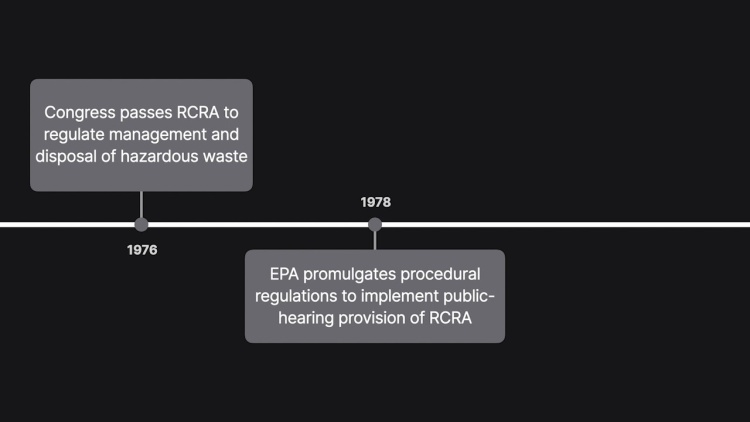Chemical Waste Management, Inc. v. United States Environmental Protection Agency
United States Court of Appeals for the District of Columbia Circuit
873 F.2d 1477 (1989)

- Written by Eric Cervone, LLM
Facts
As originally enacted by Congress in 1979, section 3008 of the Resource Conservation and Recovery Act (RCRA), 42 U.S.C. § 6928(a)-(b), required the Environmental Protection Agency (EPA) (defendant) to conduct a public hearing whenever the EPA issued an order that would impose sanctions on the operator of a hazardous-waste facility for violating the RCRA. The EPA promulgated implementing regulations (Part 22 regulations), 40 C.F.R. Part 22, that provided for the use of formal adjudicative procedures for public hearings in cases that involved the imposition of sanctions. In 1984, Congress added § 3008(h) to the RCRA, 42 U.S.C. § 6928(h), which permitted the EPA to issue corrective-action orders to facilities that had made unauthorized discharges of hazardous waste. The corrective-action orders could impose a range of sanctions for failure to comply. Congress also amended § 3008(a) to reflect that facilities that received corrective-action orders had a right to a public hearing. The EPA promulgated implementing regulations (Part 24 regulations), 40 C.F.R. Part 24, for section 3008(h). The Part 24 regulations provided that the EPA could use informal adjudicatory procedures when a corrective-action order required a facility to undertake interim corrective measures that would not be particularly expensive or complex. The informal proceeding would be held in front of either the EPA’s regional judicial officer or another EPA attorney. The EPA’s presiding officer would review the record and make a recommendation to the EPA’s regional administrator, who would make a final decision. The parties could seek judicial review of the EPA’s final decision. Chemical Waste Management, Inc. and Waste Management of North America (plaintiffs) petitioned for review in the United States Court of Appeals for the District of Columbia Circuit of the EPA’s regulations that provided informal hearings for corrective-action orders issued under section 3008(h).
Rule of Law
Issue
Holding and Reasoning (Ginsburg, J.)
What to do next…
Here's why 903,000 law students have relied on our case briefs:
- Written by law professors and practitioners, not other law students. 47,100 briefs, keyed to 995 casebooks. Top-notch customer support.
- The right amount of information, includes the facts, issues, rule of law, holding and reasoning, and any concurrences and dissents.
- Access in your classes, works on your mobile and tablet. Massive library of related video lessons and high quality multiple-choice questions.
- Easy to use, uniform format for every case brief. Written in plain English, not in legalese. Our briefs summarize and simplify; they don’t just repeat the court’s language.





